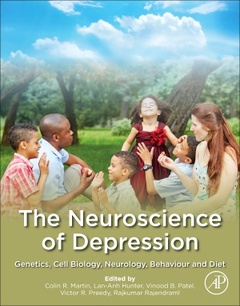The Neuroscience of Depression Genetics, Cell Biology, Neurology, Behavior, and Diet
Coordonnateurs : R Martin Colin, Hunter Lan-Anh, Patel Vinood, Preedy Victor R, Rajendram Rajkumar

The Neuroscience of Depression: Genetics, Cell Biology, Neurology, Behaviour and Diet is a comprehensive reference to the aspects, features and effects of depression. This book provides readers with the behavior and psychopathological effects of depression, linking anxiety, anger and PSTD to depression. Readers are provided with a detailed outline of the genetic aspects of depression including synaptic genes and the genome-wide association studies (GWAS) of depression, followed by a thorough analysis of the neurological and imaging techniques used to study depression. This book also includes three full sections on the various effects of depression, including diet, nutrition and molecular and cellular effects. The Neuroscience of Depression: Genetics, Cell Biology, Neurology, Behaviour and Diet is the only resource for researchers and practitioners studying depression.
I. Genetic Aspects of Depression 1. Epigenetics in depression2. Genes, depression and nuclear DNA 3. Molecular aspects of postpartum depression 4. Genetics and epigenetics of the SLC6A4 gene in depression5. Tryptophan related genes and depression 6. Metalloproteinases genes and depression7. Linking gene regions jointly with environment and depression
II. Molecular and Cellular Effects of Depression 8. Linking depression, mRNA translation and serotonin 9. Changes in cortical gene expression in major depression: More evidence implicating inflammatory-related pathways in disease aetiology10. FKBP5 gene expression and depression11. Cytokines related to depression 12. Linking Interleukin-6 and Depression 13. The role of inflammatory signaling in comorbid depression and epilepsy14. Brain inflammasomes in depression 15. Inflammatory factors and depression in substance use disorder Francisco 16. Linking Huntington disease, brain-derived neurotrophic factor and depressive-like behaviors17. Depression and the NMDA receptor/NO/cGMP pathway18. Translocator protein (18 kDa TSPO) binding in depression 19. Axonal transport proteins: what they are and how they relate to depressive behaviours 20. Molecular features of adenylyl cyclase isoforms and cAMP signaling: a link between adenylyl cyclase 7 and depression 21. Neurobiology of depression: the role of glycogen synthase kinase 322. Sortilin/NTSR3 in depression23. Wnt/beta-catenin signaling pathway and antidepressant role24. The prefrontal cortex in depression: use of proteomics
III. Neurological and Imaging Features25. SPECT Neuroimaging and depression26. Resting-state functional magnetic resonance imaging (MRI), bipolar depression and unipolar depression 27. Linking amygdala blood oxygenation-level-dependent (BOLD) activity and frontal EEG in depression28. The rostromedial tegmental nucleus: features and links with alcohol and depression29. Serotonergic neurons, selective serotonin reuptake inhibitor (SSRI) resistance and major depressive disorder30. Role of nesfatin-1 in major depression31. Impact of NGF signaling in neuroplasticity during depression: Insights in neuroplasticity dependent therapeutic approaches32. Depression and germ cells memory
IV. Behaviour and Psychopathological Effects33. Cognitive function and neurocognitive deficits in depression34. Cognitive and interpersonal contributors to relationship distress and depression35. Adolescence life stage and cognitive vulnerability to depression36. Determining the cognitive performance in first episode of depression 37. Body image and depression38. Sleep, anxiety and depression39. Depression, anxiety and quality of life40. Reward Processing and Depression: Current Findings and Future Directions41. Sexual functioning in depressive disorders
V. Diet, Nutrition and Botanicals 42. Linking dietary glycemic index and depression43. Gut microbiota and Depression44. Linking dietary methyl donors, maternal separation and depression45. Convolvulus pluricaulis usage and depression 46. Antidepressant effects of Crocus sativus (saffron) and its constituents 47. Mechanisms of action of herbal antidepressants48. Depression, antidepressant-like effects and mechanisms of the herbal formula xiaochaihutang
VI. Resources49. Resources in depression
- Features a section on neurological and imaging, including SPECT Neuroimaging
- Analyzes how diet and nutrition effect depression
- Examines the molecular and cellular effects of depression
- Covers genetics of depression
- Includes more than 250 illustrations and tables
Date de parution : 06-2021
Ouvrage de 574 p.
21.4x27.6 cm



